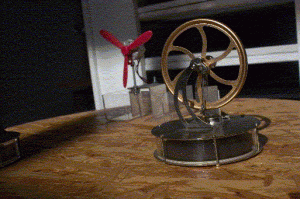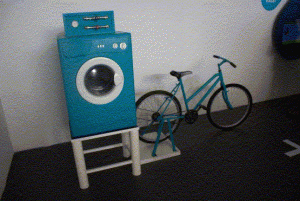Aldeia das Ciências (UNESCO Center) was created in September of 2008 by AJPRA (Associação para o Desenvolvimento Comunitário, Cultural e Educativo) with the collaboration of the National Commission of UNESCO. There are about 42 science centers throughout the country along with the Aldeia das Ciências of Évora.

Prototype of different devices that turn renewable resouces into electricity.
With objectives of promoting a conscious and participatory citizenship about the importance of water, the environment and Sustainable Development the Aldeia das Ciências conducts various activities. It mainly works with the schools, and educational organizations. Last year, it carried out an event “Earth Hour of WWF” with the bikes to illuminate the Praça do Comércio in the center of Lisbon. It also has the future plan to conduct a cinema session in which the visitor should paddle the bikes to generate the electrical energy for the film projection.
In Aldeia das Ciências, the visitor can assist an educational video about the history of the way the water was used through the ages in Évora. There are some other interactive games along with digital quizzes to share the knowledge about renewable energies like solar energy, and wind energy. The center, also exhibits the prototype of different devices that change the thermal and solar energy into electrical energy. The content of the various activities that are conducted here is infinite and depends on the imagination of its responsibles.

Washing machine operated by bicicle
The science center also provokes the habitants for the use of renewable energy. While talking about the use of renewable natural resources Aires de Carvalho said , “Solar energy has lots of advantages and there are different kinds of equipment which can use the solar energy in various ways. Due to the lack of belief on the solar devices very few people use it.” It reflects the challenges for the accessibility and the use of renewable resources within the habitants of the zone.
To wrap up, the Aldeia das Ciências has been doing its utmost to show the possible ways of getting advantages by renewable energies but it has a great difficulty in application of its renovation. There is no lack of knowledge about the renewable resources but the problem is its acceptance within the communities.
Ruben Pereira, Sharad Poudel, Kyriaki Hadjichambi, , Katerina Papamiltiadous
YRE International Mission Alentejo 2016 | Portel




You must be logged in to post a comment.